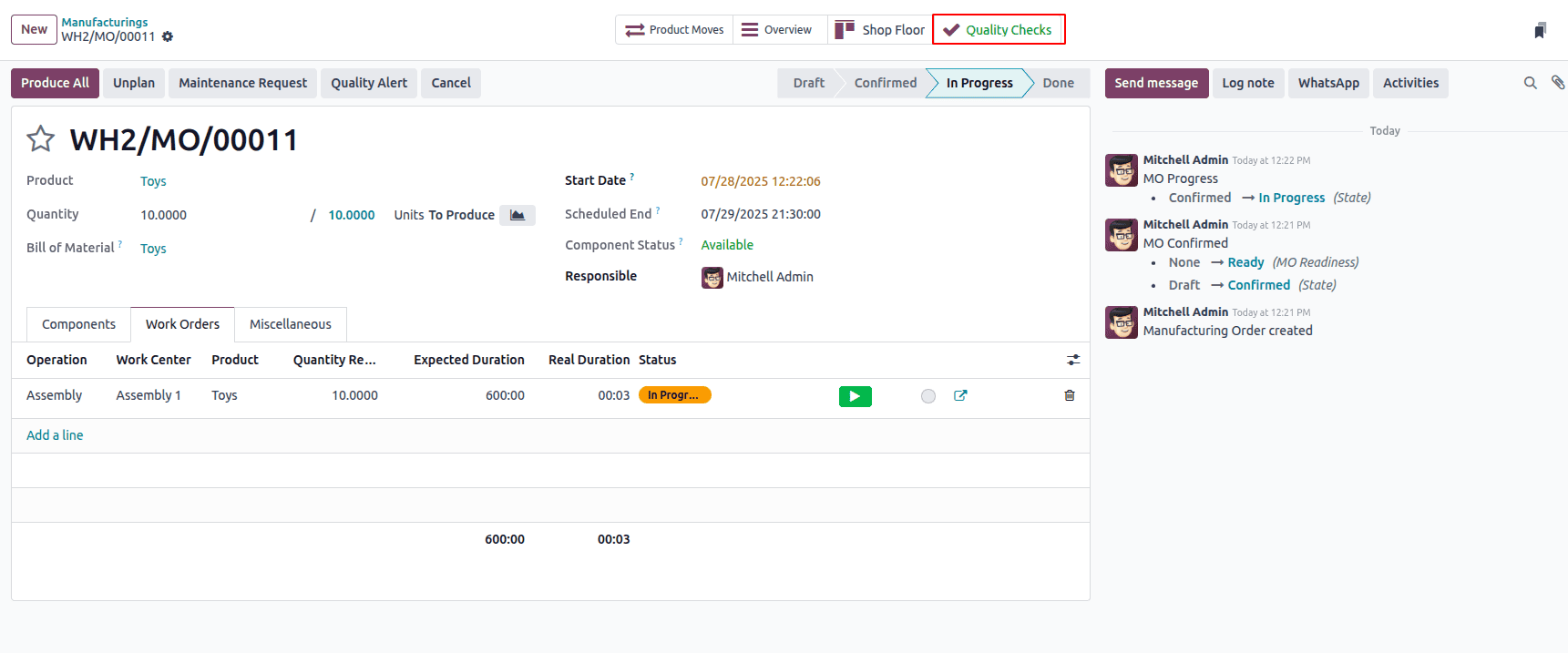Are you struggling to keep your business quality consistent while juggling countless tasks? Imagine having a powerful tool that helps you track, manage, and improve quality across every department—without the usual headaches.
That’s where Odoo steps in. It’s not just software; it’s your partner in making quality a priority, simplifying complex processes, and ensuring your customers get the best every time. Ready to see how Odoo can transform your approach to quality?
Keep reading to discover the secrets behind seamless quality management made easy.
Odoo’s Role In Quality Management
Odoo plays a vital role in managing quality across businesses. It helps keep products and services consistent and reliable. The system tracks defects, controls processes, and supports compliance with standards. This makes quality management easier and more effective for teams.
Core Quality Features
Odoo offers tools to check and maintain quality at every step. It includes quality checks, alerts, and control points. Users can record issues and manage corrective actions directly. These features help spot problems early and reduce errors in production.
Integration With Other Modules
Odoo’s quality management works well with other parts of the system. It connects with inventory, manufacturing, and sales modules. This link keeps data updated and consistent across departments. It also helps teams act fast on quality issues by sharing information instantly.
Streamlining Quality Checks
Quality checks are essential for any business that wants to deliver excellent products. Odoo helps make these checks faster and more accurate. It reduces errors and saves time. Teams can focus on improving products instead of fixing mistakes.
With Odoo, quality checks become a smooth part of daily work. The system guides users through each step. This reduces confusion and missed tasks. Quality control becomes easier and more reliable.
Automated Inspections
Odoo allows businesses to set up automated inspections. This means checks happen at the right time without manual work. The system uses rules to start inspections during production or before shipping. This ensures no step is skipped.
Automated inspections help catch problems early. They keep products within quality standards. Teams get alerts if something is wrong. This saves money by avoiding large recalls or fixes later.
Real-time Issue Tracking
Odoo tracks quality issues as they happen. Teams see problems immediately on their screens. This quick feedback helps solve issues faster. It stops bad products from reaching customers.
Real-time tracking also records all problems in one place. Managers can analyze data and find common defects. This helps improve processes and reduce future errors. Odoo makes quality control transparent and effective.
Enhancing Efficiency With Automation
Automation improves how work gets done in any business. It saves time and reduces mistakes. Odoo uses automation to help companies stay organized and efficient. This section explains how automation in Odoo boosts quality and productivity.
Automating tasks means less manual work. It speeds up processes and keeps information accurate. Teams can focus on important jobs instead of repetitive tasks.
Workflow Automation
Odoo allows businesses to automate their workflows easily. Tasks like approvals, notifications, and data entry happen automatically. This keeps work moving without delays or confusion.
Automated workflows ensure everyone knows what to do next. It reduces waiting time and speeds up project completion. Consistent processes lead to better results every time.
Error Reduction Techniques
Automation cuts down human errors significantly. Odoo uses rules and validations to check data before saving it. This stops wrong information from causing problems later.
Automatic alerts notify users about mistakes early. Fixing errors quickly saves time and money. Clean data improves decision-making and boosts overall quality.
Data-driven Quality Insights
Data-driven quality insights help businesses improve products and processes. Odoo collects data from many sources to give clear views on quality. This approach reduces errors and boosts customer satisfaction. It also supports fast, informed decisions based on real facts.
Customizable Reports
Odoo lets users create reports tailored to their needs. You can choose what data to show and how to display it. This makes it easier to track quality issues and trends. Custom reports save time by focusing only on important information. Teams can share these reports to keep everyone informed.
Analytics For Continuous Improvement
Odoo uses analytics to find patterns in quality data. It highlights problems before they grow bigger. This helps teams fix issues quickly and avoid repeats. Continuous improvement comes from learning and adapting. Analytics provide clear evidence to support better choices every day.
User-friendly Interfaces And Accessibility
Odoo stands out for its user-friendly interfaces and easy accessibility. These features help businesses manage quality without hassle. Simple design and clear navigation make Odoo easy to use for everyone. Users find tasks faster and complete work with fewer errors.
Accessibility is key for modern work. Odoo offers tools that let users work from anywhere. This flexibility supports better quality control and faster decision-making. The system adapts to different devices and user needs.
Mobile And Cloud Access
Odoo works smoothly on mobile devices and in the cloud. Teams can check quality data on phones or tablets. Cloud access means no need for complex installations or updates. Users stay connected and informed at all times.
Mobile access improves reaction time. Quality issues get noticed and fixed quickly. This reduces delays and supports consistent standards. Cloud storage keeps data safe and easy to share.
Custom Dashboards
Odoo lets users build custom dashboards to fit their needs. Dashboards show key quality indicators clearly. Users see important data at a glance. This saves time and helps focus on what matters most.
Customization means each team can track their unique goals. Visual charts and reports make understanding easier. Teams spot trends and problems faster. Custom dashboards make quality management smarter and more efficient.

Case Studies Of Odoo In Quality
Odoo offers effective tools to improve quality in many industries. Real case studies show how companies use Odoo to manage quality and boost efficiency. These examples prove Odoo’s value in different business settings.
Manufacturing Success Stories
Manufacturers use Odoo to track product quality from start to finish. One factory improved defect detection by using Odoo’s quality checks. This led to fewer returns and better customer satisfaction.
Another company used Odoo to manage supplier quality. They automated inspections and reduced errors by 30%. This saved time and improved product reliability.
Service Industry Applications
Service companies rely on Odoo to maintain high quality in their work. A cleaning service used Odoo to schedule quality audits. This helped catch issues early and keep clients happy.
In healthcare, Odoo tracks compliance with safety standards. A clinic improved patient care by using Odoo’s quality tools. Staff reported fewer mistakes and faster issue resolution.
Best Practices For Implementing Odoo Quality
Implementing Odoo Quality requires careful planning and clear strategies. Best practices help businesses ensure smooth adoption and effective use. This approach improves product standards and reduces errors. Following proven steps makes the process easier for teams and management.
Training And Support
Training is essential for successful Odoo Quality use. Employees must understand how to use the system correctly. Simple and clear training sessions help users learn faster. Support should be available to solve problems quickly. This keeps the workflow smooth and avoids delays. Continuous learning helps teams stay updated with new features.
Scalable Solutions
Choose scalable solutions to match business growth. Odoo Quality should adapt as the company expands. Start with basic features and add more as needed. This avoids overwhelming users with too many tools at once. A flexible system supports changing requirements without extra costs. Scalability ensures long-term success and better quality control.


How Our Company Can Help You with Odoo And Quality
Practical Learning Opportunities with Odoo and Quality Management
Understanding Odoo’s role in quality management goes beyond theory—it’s about applying knowledge to drive real improvements. To truly benefit from Odoo, focus on hands-on experiences that emphasize streamlining quality checks and leveraging data-driven quality insights. These practical steps help build confidence in using Odoo’s automation features to enhance operational efficiency.
- Engage with real-world scenarios to practice setting up quality control points and automated alerts.
- Analyze sample datasets to interpret quality trends and make informed decisions.
- Explore user-friendly interfaces to customize workflows that fit your team’s specific needs.
By approaching Odoo with a mindset geared toward continuous learning and adaptation, businesses can optimize their quality processes effectively. For those seeking tailored guidance or deeper understanding, consulting with experts experienced in Odoo’s quality modules can provide valuable insights without overwhelming technical jargon. Feel free to reach out to knowledgeable professionals who can assist in navigating the implementation process smoothly.
Frequently Asked Questions
What Is Odoo’s Role In Quality Management?
Odoo streamlines quality management by integrating inspections, alerts, and quality control points. It helps businesses maintain product standards efficiently and reduce defects through automation and real-time tracking.
How Does Odoo Improve Product Quality?
Odoo improves product quality by automating quality checks, ensuring compliance, and tracking defects. This reduces errors and boosts customer satisfaction through consistent quality monitoring.
Can Odoo Handle Quality Control In Manufacturing?
Yes, Odoo supports quality control in manufacturing by managing inspections, quality alerts, and corrective actions. It helps manufacturers maintain high standards and comply with industry regulations.
Is Odoo Suitable For Quality Management In Smes?
Odoo is ideal for SMEs due to its flexibility, scalability, and affordable quality management features. It simplifies quality processes, making it accessible for small and medium businesses.
Conclusion
Odoo helps businesses keep quality in check every step. It organizes tasks and tracks progress clearly. Teams work better and avoid mistakes. This leads to happier customers and fewer problems. Using Odoo means saving time and effort on quality control.
It fits many business types and sizes. Quality becomes easier to manage and improve. Odoo supports growth with simple, smart tools. A reliable choice for those who want steady quality.